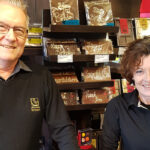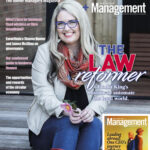Pakihi mo te iwi: Business for the people
The Māori Economy is on the rise in Aotearoa – driven by a generation of entrepreneurs with…
The Māori Economy is on the rise in Aotearoa – driven by a generation of entrepreneurs with an inspirational, whānau-centric approach to business. Whale Watch Kaikōura’s Kauahi Ngapora and Rise2025 founder Rachel Petero epitomise a courageous new vision.
hen Whale Watch Kaikōura began life in 1987, in the pre-treaty settlement era, more than 90 percent of local Māori were unemployed. The business has known tough times and boom times since its inception – by far the most disruptive event being last November’s magnitude 7.8 earthquake, some 30 years after Whale Watch Kaikōura first opened its doors.
Four local whānau mortgaged their houses to start the business – risking everything on a vision for a better future for their people. The aim was to create employment for local Māori and establish an economic base for local hapu (sub-tribe) Ngāti Kuri.
Unfortunately the early days of the business were marked by racial divisions within the wider community and a negative perception towards Māori by non-Māori.
“Our business was subject to things no business should be subject to, such as vessels and engines being sabotaged and our tour bus being firebombed and completely gutted by fire,” recalls Kauahi Ngapora, Whale Watch Kaikōura’s general manager.
“Our leadership put in a lot of time and effort engaging with many of the long-term non-Māori families around Kaikōura to break down barriers and build bridges. Honest and frank discussions were had.”
He says a targeted approach to bring those families into the fold began, and it was probably the first time in Kaikōura’s history that Māori employed non-Māori.
“Over time these families became strong advocates of the business.”
The poor community view on local tourism was also addressed over time. As investment opportunities came along, more locals were employed and support for tourism went up.
“Kaiko¯ura has come a long way from the early days and is an example of what can be achieved through strong leadership and a community coming together,” says Kauahi.
Whale Watch Kaiko¯ura has two shareholders: the Tukete Charitable Trust, representing the founding families (56.5 percent), and Ngāi Tahu Holdings (43.5 percent). It is 100-percent Māori owned and connects directly to Ngāti Kuri and the other 17 hapu of Ngāi Tahu.
“Whānau is at the heart of Whale Watch Kaiko¯ura,” explains Kauahi, “as is the integration of traditional values early on – such as Whānaungatanga (relationships), Manaakitanga (hospitality), Kaitiakitanga (guardianship), and ‘Tangata’ (people) – into the fabric of how we operate as a business.
“We also take an inter-generational view on business and planning decisions – to do what we can to leave a legacy for the next generation to build on and to shape for themselves.”
Kauahi acknowledges that close connection to family can be both a positive and negative in a business environment. “But this is something that Māori businesses have to manage because whānau is so important.”
He says the appetite for risk can be a lot less in a Māori business, given the intergenerational considerations of the business and the aspirations of shareholders.
The night the land shook
Long before Europeans arrived in New Zealand, Māori had experienced rū whenua (‘the shaking of the land’). The quake that shook Kaiko¯ura on November 14, 2016, had a profound impact on Whale Watch Kaiko¯ura – primarily around the disruption caused by damage to the marina and subsequent restoration work.
The business is not expected to return to its pre-quake growth trajectory until the end of the 2018/19 financial year.
Kauahi says they’ve had to operate at just 20 percent operational capability since restarting commercial tours at the beginning of the year.
Operations have had to be significantly modified, including the trailer used for loading and unloading passengers.
Temporary boarding ramps were built to allow for the damaged berths to be used before they were completely dismantled. The public jetty has also been modified to load and unload passengers and there’s now a temporary loading/unloading option for the north wharf.
Insurance money and cash reserves have kept the company going, and Kauahi says the focus has been on the restoration of local infrastructure so they can return to 100-percent operational capability as soon as possible.
Whale Watch Kaiko¯ura is also grateful for the support of a $5.7 million government grant to help restore the Kaiko¯ura Marina which encompasses the company’s main area of operation.
Whale-size achievements
Kauahi and the rest of the management team prescribe to the long-held belief that your people are your greatest asset and your future.
“What gives me the most satisfaction is seeing our people doing well through their own professional achievements, skill development and educational advancement,” says Kauahi.
He says the foundation of Whale Watch Kaiko¯ura is based around five beliefs. Namely:
• Customers – “Welcoming visitors, hosting them well and treating them as whānau is a core belief for Māori. Those of us lucky enough to spend time growing up on our marae know first-hand what this means.
“Like the marae, the same belief can be cultivated within your business through a whānau-centric approach to customer service and experience delivery.”
• Company – “Making sure you have, and maintain, a strong foundation to sustain your people, enabling you to shape your own destiny and support aspirations for the future. This is about mana (authority), empowerment and being able to do what you want to do, rather than what you have to do.
• Community – “You must bring your community along for the ride. For us the community is as much a part of Whale Watch Kaiko¯ura as Whale Watch Kaiko¯ura is a part of the community.”
• Conservation – “As a Māori business with an inter-generational outlook it is important we do what we can to ensure that what we have today can be experienced by future generations. As kaitiaki (guardians) we have a responsibility to protect our local environment and the taonga (treasures) within it. Our visitors expect us to operate in a responsible and sustainable manner.”
• Culture – “Culture is what shapes us, from the deeds of our tupuna (ancestors or grandparents) through to our current endeavours that future generations will reflect on, as we have done. We must always consider where we have come from as we shape our pathways for the future.”
Kauahi believes the Māori economy has “so much going for it”.
“From the unique cultural experiences that cannot be experienced anywhere else in the world, the treaty settlements providing new capital for iwi, through to the maturing and development of Māori entrepreneurs and entities into genuine economic powerhouses.”
As for Whale Watch Kaiko¯ura, as things slowly return to normal, the evolution will continue. The plan is for new, larger vessel technology and new office facilities on the company’s peninsula property – thereby improving the overall experience delivered to guests.
Although the land has been mightily shaken, the resolve to grow and enhance Whale Watch Kaiko¯ura for the betterment of the local community has held firm.


